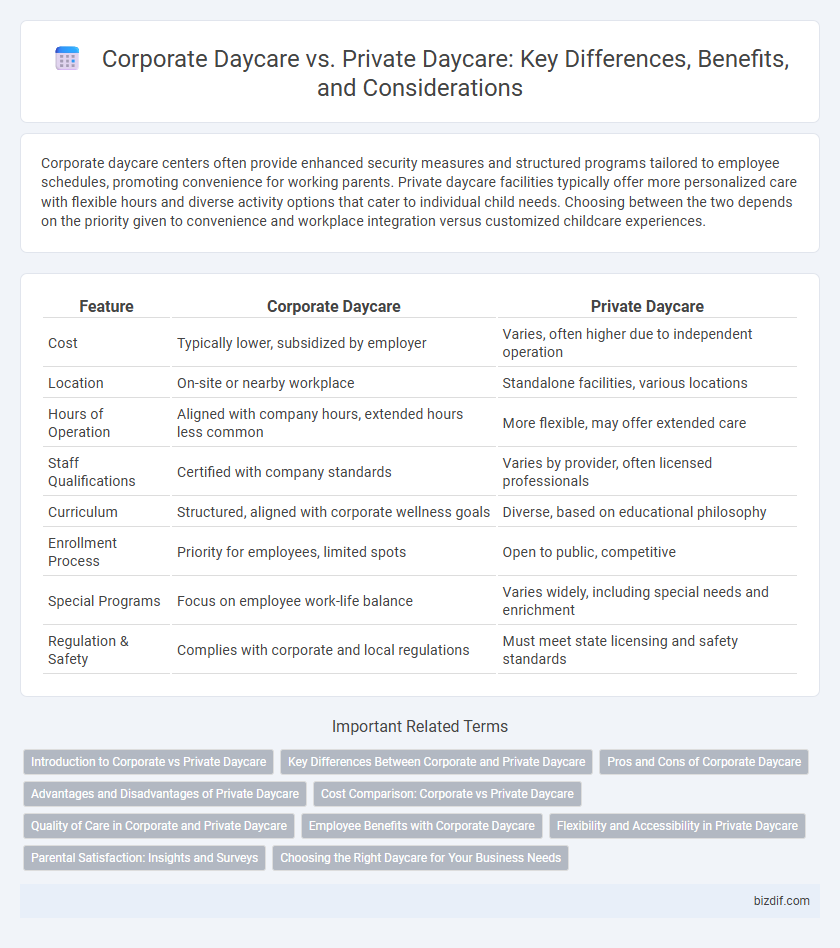Corporate daycare centers often provide enhanced security measures and structured programs tailored to employee schedules, promoting convenience for working parents. Private daycare facilities typically offer more personalized care with flexible hours and diverse activity options that cater to individual child needs. Choosing between the two depends on the priority given to convenience and workplace integration versus customized childcare experiences.
Table of Comparison
| Feature | Corporate Daycare | Private Daycare |
|---|---|---|
| Cost | Typically lower, subsidized by employer | Varies, often higher due to independent operation |
| Location | On-site or nearby workplace | Standalone facilities, various locations |
| Hours of Operation | Aligned with company hours, extended hours less common | More flexible, may offer extended care |
| Staff Qualifications | Certified with company standards | Varies by provider, often licensed professionals |
| Curriculum | Structured, aligned with corporate wellness goals | Diverse, based on educational philosophy |
| Enrollment Process | Priority for employees, limited spots | Open to public, competitive |
| Special Programs | Focus on employee work-life balance | Varies widely, including special needs and enrichment |
| Regulation & Safety | Complies with corporate and local regulations | Must meet state licensing and safety standards |
Introduction to Corporate vs Private Daycare
Corporate daycare centers are typically sponsored and operated by businesses to support their employees by providing convenient, on-site childcare services that align with company schedules and policies. Private daycare facilities operate independently, offering a broader range of programs and flexible hours that cater to diverse family needs, often allowing for more personalized care. The key differences lie in the location, funding, and target clientele, with corporate daycares emphasizing employee convenience and private daycare centers prioritizing individualized child development services.
Key Differences Between Corporate and Private Daycare
Corporate daycare centers are typically operated by large companies or organizations and offer structured programs with standardized policies, often providing convenience for employees. Private daycare centers are independently owned and may offer more personalized care with flexible hours, varied programs, and diverse pricing options. Key differences include funding sources, regulatory oversight, curriculum consistency, and accessibility based on parent affiliation with the corporate entity.
Pros and Cons of Corporate Daycare
Corporate daycare offers convenience and cost savings for employees by providing on-site childcare, fostering improved work-life balance and increased job satisfaction. However, it may have limited flexibility in hours and age groups compared to private daycare centers that often provide more personalized care and diverse programs. Corporate daycare's integration within the workplace can enhance employee retention but might lack the intimate, home-like environment many parents seek.
Advantages and Disadvantages of Private Daycare
Private daycare centers offer flexible hours and personalized care, often tailoring programs to meet individual child needs and preferences. However, they can be more expensive than corporate daycare and may lack the extensive resources or standardized curriculum found in larger corporate facilities. Parents should weigh the benefits of smaller class sizes and individualized attention against higher costs and variability in staff qualifications.
Cost Comparison: Corporate vs Private Daycare
Corporate daycare centers typically offer lower costs due to employer subsidies and bulk care agreements, making them more affordable for employees compared to private daycare facilities. Private daycare centers often charge higher fees, reflecting their operational independence and amenities offered, with average monthly costs ranging from $1,000 to $1,500 compared to corporate daycare expenses that can be 20-40% less. Families should evaluate cost benefits alongside service quality when choosing between corporate and private daycare options.
Quality of Care in Corporate and Private Daycare
Corporate daycare centers often invest in standardized training programs and adhere strictly to regulatory guidelines, ensuring consistent quality of care through qualified staff and structured curricula. Private daycare facilities may offer more personalized care with flexibility in caregiving approaches, though quality can vary widely depending on the provider's resources and expertise. Evaluating caregiver-to-child ratios, staff qualifications, and curriculum implementation are critical when comparing quality of care between corporate and private daycare settings.
Employee Benefits with Corporate Daycare
Corporate daycare centers offer significant employee benefits by providing convenient, on-site childcare that reduces commuting time and stress for working parents. These facilities often include subsidized fees or free services, improving employee satisfaction, retention, and productivity. Access to corporate daycare also fosters a supportive workplace culture by promoting work-life balance and reducing absenteeism.
Flexibility and Accessibility in Private Daycare
Private daycare centers often offer greater flexibility in scheduling, accommodating varying work hours and last-minute changes to support diverse family needs. Accessibility is enhanced by a wider geographic distribution and personalized services, making private daycare a convenient option for busy parents. These centers typically provide options for extended hours, part-time care, and customized programs, differentiating them from the more rigid corporate daycare schedules.
Parental Satisfaction: Insights and Surveys
Parental satisfaction surveys reveal higher approval rates for corporate daycare centers due to structured programs, enhanced safety protocols, and employee benefits such as discounted fees. In contrast, private daycare providers often score lower in satisfaction despite personalized care, mainly because of inconsistent quality and higher costs. Data from recent studies indicate corporate daycare parents report 25% greater overall contentment and 30% more trust in staff professionalism compared to private daycare counterparts.
Choosing the Right Daycare for Your Business Needs
Corporate daycare often provides on-site childcare services tailored to employees, enhancing work-life balance and reducing absenteeism, while private daycare centers offer diverse programs with varying costs and facilities. Evaluating factors such as location, staffing qualifications, safety standards, and alignment with company culture is essential for selecting a daycare that meets business needs and supports employee satisfaction. Prioritizing flexible hours, quality care, and communication channels can optimize employee productivity and retention in a corporate environment.
Corporate daycare vs Private daycare Infographic

 bizdif.com
bizdif.com